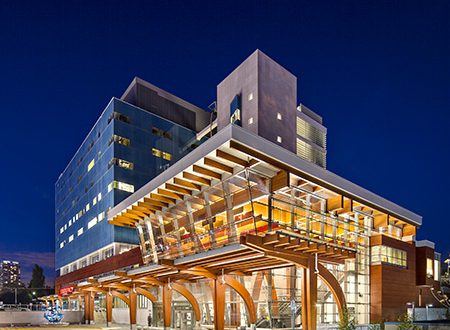SURREY residents now have improved same-day access to urgent primary care with the opening of the new Surrey Urgent Primary Care Centre at 9639 137A Street.
This is the fourth centre of its kind to be operating now in British Columbia under the government’s strategy to transform primary care.
“The Surrey Urgent Primary Care Centre will connect patients with ongoing primary health care delivered by a team of professionals, as well as provide a same day-care alternative to waiting in emergency department,” said Health Minister Adrian Dix. “At least a quarter of visits to the Surrey Memorial Hospital emergency department involve individuals who should be seen by member of a primary health-care team, including a family doctor, nurse practitioner or other health-care professional. This centre will now provide that option.”
The centre officially opened Tuesday, November 13 with a few scheduled appointments the previous week. Since its first day, the centre’s team has been attaching patients to primary caregivers. When the centre reaches full capacity, it will be able to attach up to 5,000 patients.
The centre will focus on attaching vulnerable residents who have complex care needs, including the frail and elderly, and people needing specialized mental-health and substance-use services, as well as residents of the North Surrey / Whalley community.
“This new urgent primary care centre will make it easier for the people of Surrey to access care that is appropriate and timely,” said Dr. Victoria Lee, Fraser Health’s President and CEO. “This multidisciplinary team-based approach to providing health care means people have access to a variety of caregivers to address their needs.”
As part of the new team-based model of care being implemented under the government’s primary care strategy, the centre has doctors, nurses, nurse practitioners, pharmacists, medical office assistants and other health-care professionals working together to the full extent of their skills, providing a broad range of services.
The centre is also providing diagnosis and care for non-emergency conditions requiring medical attention within 12 to 48 hours, including sprains, urinary problems, minor cuts or burns, lacerations, earaches and sore throats.
Local residents will be directed to the centre by community or hospital care providers and can also walk in. They can make appointments, including one-on-one visits and appointments with multiple providers.
Over time, the centre anticipates providing telehealth visits and home visits, in addition to group appointments for people with similar conditions. The centre also will provide outreach services, connecting nurses to community locations, such as shelters.
Quick Facts:
* Located at 9639 – 137A Street, the Surrey centre will be open for patient visits from 11 a.m. to 5 p.m., November 14 through November 16; from 10:30 a.m. to 5:30 p.m., from November 19 to January 10, 2019, Monday to Friday.
* In January 2019, the centre will operate from 10 a.m. to 10 p.m., seven days a week.
* The centre opened to several previously booked patients on November 8.
* Annual staffing and operating costs are projected at approximately $3.8 million.
* One-time capital costs are estimated at $3.1 million.
* Approximately 78,000 people in Surrey do not have a family care provider.
* In North Surrey, approximately 9,700 people do not have a family care provider.
* In Whalley, approximately 9,300 people do not have a family care provider.
* In the communities of Whalley and North Surrey, there are over 2,100 unattached individuals who belong to high needs and/or vulnerable population segments.
* A total of 10 urgent primary care centres will be in operation throughout the province by spring 2019.
* In addition to these centres, the Province’s new primary health-care strategy, which is focused on providing all British Columbians with improved access to team-based health care, will see government fund and recruit 200 family doctors and 200 nurse practitioners, and hire 50 clinical pharmacists.
* Primary care is the day-to-day health care given by a health-care provider. Urgent primary care is the care that people need within 12 to 48 hours, for conditions such as sprains, urinary problems, minor cuts or burns.
* Throughout the province, 70% of communities will form primary care networks over the next three years. These networks will bring together and co-ordinate local health-care providers, services and programs, making it easier for people to access regular care providers, receive followup care and connect to other services they may need.
 Desi Today Magazine
Desi Today Magazine




